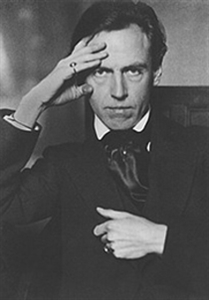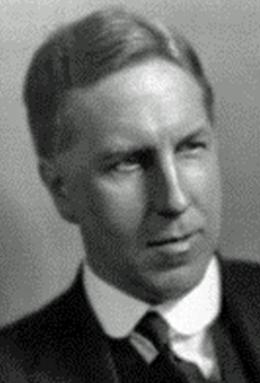Related Research Articles

Sir Henry Walford Davies was an English composer, organist, and educator who held the title Master of the King's Music from 1934 until 1941. He served with the Royal Air Force during the First World War, during which he composed the Royal Air Force March Past, and was music adviser to the British Broadcasting Corporation, for whom he gave commended talks on music between 1924 and 1941.
Alfred Uhl was an Austrian composer, violist, music teacher and conductor.
Denis ApIvor was a British composer, best known for his ballet score Blood Wedding. He had a parallel career as a consultant anaesthetist.

Cyril Meir Scott was an English composer, writer, poet, and occultist. He created around four hundred musical compositions including piano, violin, cello concertos, symphonies, and operas. He also wrote around 20 pamphlets and books on occult topics and natural health.

Edgar Leslie Bainton was a British-born, latterly Australian-resident composer. He is remembered today mainly for his liturgical anthem And I saw a new heaven, a popular work in the repertoire of Anglican church music, but during recent years Bainton's other musical works, neglected for decades, have been increasingly available in commercial recordings.

Sir John Blackwood McEwen was a Scottish classical composer and educator. He was professor of harmony and composition at the Royal Academy of Music, London, from 1898 to 1924, and principal from 1924 to 1936. He was a prolific composer, but made few efforts to bring his music to the notice of the general public.

Bernard Hélène Joseph van Dieren was a Dutch composer, critic, author, and writer on music, much of whose working life was spent in England.
Adam Von Ahnen Carse was an English composer, academic, music writer and editor, remembered today for his studies on the history of instruments and the orchestra, and for his educational music. His collection of around 350 antique wind instruments is now in the Horniman Museum.

Thomas Frederick Dunhill was a prolific English composer in many genres, though he is best known today for his light music and educational piano works. His compositions include much chamber music, a song cycle, The Wind Among the Reeds, and an operetta, Tantivy Towers, that had a successful London run in 1931. He was also a teacher, examiner and writer on musical subjects.

Lucijan Marija Škerjanc was a Slovene composer, music pedagogue, conductor, musician, and writer who was accomplished on and wrote for a number of musical instruments such as the piano, violin and clarinet. His style reflected late romanticism with qualities of expressionism and impressionism in his pieces, often with a hyperbolic artistic temperament, juxtaposing the dark against melodic phrases in his music.
Huw Thomas Watkins is a British composer and pianist. Born in South Wales, he studied piano and composition at Chetham's School of Music in Manchester, where he received piano lessons from Peter Lawson. He then went on to read music at King's College, Cambridge, where he studied composition with Robin Holloway and Alexander Goehr, and completed an MMus in composition at the Royal College of Music, where he studied with Julian Anderson. Huw Watkins was awarded the Constant and Kit Lambert Junior Fellowship at the Royal College of Music, where he used to teach composition. He is currently Honorary Research Fellow at the Royal College of Music.

Arthur Catterall was an English concert violinist, orchestral leader and conductor, one of the best-known English classical violinists of the first half of the twentieth century.
Robert Moffat (variously "Moffatt" and "Moffett") Palmer was an American composer, pianist and educator. He composed more than 90 works, including two symphonies, Nabuchodonosor, a piano concerto, four string quartets, three piano sonatas and numerous works for chamber ensembles.

Karol Rathaus was a German-Austrian Jewish composer who immigrated to the United States via Berlin, Paris, and London, escaping the rise of Nazism in Germany.
Pamela Harrison was an English composer, pianist and music teacher.

Susan Spain-Dunk FRAM was an English composer, conductor and violinist/violist.

The Carnegie Collection of British Music was founded in 1917 by the Carnegie Trust to encourage the publication of large scale British musical works. Composers were asked to submit their manuscripts to an anonymous panel. On the panel at various times were Hugh Allen, Granville Bantock, Arnold Bax, Dan Godfrey, Henry Hadow and Donald Tovey. Up to six works per year were chosen for an award – publication at the expense of the Trust, in conjunction with music publishers Stainer & Bell. Unfortunately the war delayed things for the earliest prizewinners. The first to be published was the Piano Quartet in A minor by Herbert Howells.. By the end of 1920 some 13 works were available. 30 were out by the end of 1922, and when the scheme finally closed in 1928 some 60 substantial works that might not otherwise have seen the light of day had been issued under the Carnegie Collection of British Music imprint.
Lena Wood,, was a British violist with the Birmingham Philharmonic String Orchestra and the Birmingham Ladies' String Quartet. She was a pupil of Lionel Tertis, performing and broadcasting with a number of ensembles from the 1920s to the 1950s.
References
- ↑ Morning Post, 7 May 1886, p.3
- ↑ British Chamber Music Concerts (1896-97)
- ↑ The Times, 3 December 1898, p. 5
- ↑ Pegg, Joseph W. Newcastle's Musical Heritage, an Introduction (2003)
- ↑ Borthwick, Mary. The Life and Musical Achievements of William Gillies Whittaker, Durham University Thesis (2007)
- ↑ Jones, Michael. "Edgar Bainton Musical and spiritual Traveller". MusicWeb International. Retrieved 22 April 2022.
He was also part of an important musical circle for introducing much new British music. Works by Holst, Bax, Vaughan Williams and many others were performed for the first time in the area, largely through the pioneering efforts of Bainton, his close friend William Gillies Whittaker, [...] the violinist Alfred Wall [...]
- 1 2 3 Radio Times, Issue 603, 19 April 1935, p. 55
- ↑ Radio Times, Issue 83, 24 April, 1925, p. 9
- ↑ Radio Times, Issue 320, 15 November, 1929, p. 37
- ↑ Thompson, Kenneth. A Dictionary of 20th Century Composers (1973), p. 118
- 1 2 Obituary, Newcastle Journal, 10 October 1936, p. 12
- ↑ Penrith Observer, 13 October 1936, p. 9
- ↑ Central Newcastle High School for Girls Magazine, December 1936
- ↑ Camm, F.J., ed. (6 February 1937). "Practical and Amateur Wireless" (PDF). 9 (229): 662. Retrieved 22 April 2022.
Jean Salder and his Serenaders: This combination of six players has had 26 broadcasts in its first year on the air.
{{cite journal}}: Cite journal requires|journal=(help) - ↑ "BBC Programme Index". genome.ch.bbc.co.uk. 23 February 1939. Retrieved 22 April 2022.
The nucleus of the orchestra at the Palace Hotel [Torquay] is formed by Jean Salder and his Serenaders, who are frequent broadcasters. Jean Salder showed talent at an early age, and became musical director of a cinema in Birmingham when he was only fourteen years old.
- ↑ "Alfredo Campoli Collection". Concert Programmes. Retrieved 22 April 2022.
08 June 1963, Truro Cathedral, Cornwall Symphony Orchestra, Jean Salder
- ↑ Newton Abbot Orchestra, history
- ↑ Art Workers' Guild
- ↑ Music News and Herald, October 21, 1922
- ↑ Dutton Epoch CDLX7396 (2022)
- ↑ BBC Proms Performance Archive
- ↑ Scott, Stuart. 'Arthur Catterall - The Manchester Years' at MusicWeb International
- ↑ Hayward, John D. Chamber Music for Amateurs (1923), p. 36
- ↑ Manchester Guardian, 25 May 1922, p. 11
- ↑ Manchester Guardian, 10 October 1922, p. 16
- ↑ Musical Times, Vol. 66, No. 993 (Nov. 1, 1925), p. 996
- ↑ Radio Times, Issue 115, 4 December 1925, p. 26
- ↑ Radio Times, Issue 441, 11 March, 1932, p. 36
- ↑ Manchester Guardian, 11 December 1935, p. 8
- ↑ Musical Times, Vol. 78, No. 1127 (Jan., 1937), p. 71